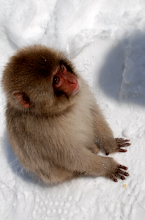I had heard about "darui" a few months back while studying some Japanese. It's a word associated with the summer months because Japanese summers are so 'mushiatsui'. This means hot AND HUMID. Notice the stress on the HUMID part. The apparent Japanese cure for thes e summer blues is eating unagi. For the uninitiated, this is eel. Apparently eating eels will strengthen your resolve and relieve you of that drained, constantly tired, always parched feeling. This summer, there are two officials days of unagi eating: today and and next week August 4th. These are the predicted peak days of feeling so drained that you have no strength and no will to move. Officially, these two days are called 'natsu no doyou no ushi no hi'. Loosely translated, this means "the day of summer's dog days of (cows?)". Hmmm... the translation seems to break down for me here, but after doing a basic search online, it seems that I'm right. I guess a better translation would be something like: the day to fortify yourself during summer's hottest days. FYI, the cow/ox is the zodiac's workhorse animal and symbolizes having the strength to finish difficult tasks. I'm a cow. Read into that what you will.
In Canada, the summers might have 3 or 4 days where the temperature is really high, but maybe not that humid. On these days, there are public service announcements made on radio and tv that advise you not to spend too much time outdoors unless you have to. And regardless of whether you spend some time outside or not, they advise you to drink plenty of water. Apparently these types of really hot days are especially taxing on young children and older people. For these types of days, we are talking temperatures of over 26 deg C to about 34 deg C and high humidity, or just over 30 deg C without the humidity factor. It almost seems humourous from where I am sitting now.
I am sitting my air-conditioned apartment with the air-conditioning units set at about 24 deg C. The municipality suggests a balmy 27 deg C as your standard daytime setting for your air-conditioners. Obviously, we've taken this heart since we used to set them at about 21 deg C. We like to do our part. Okay, I was being cheeky. But can you blame me? Even with air-con on all day, and about 2.5 litres of H2O, I feel tired.... More than tired, I feel 'darui'. It's that drained feeling of having no energy. Of thinking that if I moved another muscle in my body, I would melt into oblivion. Or if I had some ice cream (70 ml is a about the size of a standard gourmet cup here) it wouldn't be enough; I would need a 2 L tub of it to cool me down.
When I first heard about this 'darui' word, I thought, "How bad could it possibly be?" I mean, Japan has a summer every year and people manage to live through it. Now, I'm sitting here thinking, how do people get on their bikes and cycle 10 feet without breaking out into a sweat? Even walking from my home to the train station is an effort. And to be fair, only the first 1.5 minutes of it really has to be outside; the rest of the 12 minute walk can be done indoors, underground, or under reasonable cover of shade. And yet... that walk out to get my iced soymilk latte just seems to be somewhat overwhelming. I mean, is it a special occassion? No, then I'll make do with my homemade ice tea. I figure all that effort to walk 12 minutes to the coffee shop and back, plus the effort of drinking and digesting that latte is all nullified by the amount of sweat used to achieve all those steps. It's a zero-sum process and hence I stay put indoors, writing this blog. That's how 'darui' is affecting my rational thought process.
As a special effort to join in on the Japanese traditions while I can in this country, for today's strength fortifying day, I will go out and eat unagi prepared the traditional way on skewers, with soya sauce and pepper and charbroiled over an open flame (someone should tell Harvey's about this delicacy!). As with most Japanese dishes, this one almost always comes with a bowl of rice. Chumon wa, unagi wo hikutsu onegai! (Note that kutsu is the counter for skewers). After that - ganbarimasu!
Thursday's Photo
9 years ago


No comments:
Post a Comment